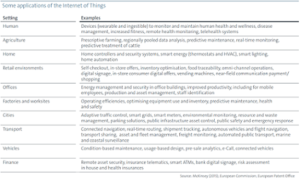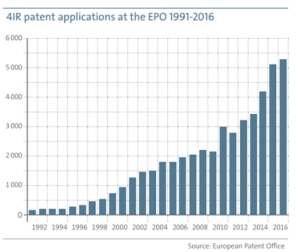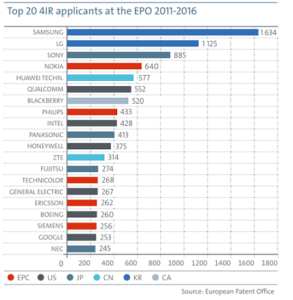Utterly crackers – is the UK registered design system fit for purpose?
We consider whether the UK registered design system is fit for purpose with a recent example concerning the takedown…
The Internet of Things (IoT) is fuelling a wave of digital transformation right across a host of different sectors. IoT devices are already taking control of manufacturing processes, power grids and transportation systems. It is also being applied in more personal domains, such as assisting in the management of our homes, travel in our cars and shopping in stores.
This digital transformation originates in the rapid development and deployment of autonomously operating, interconnected smart devices across wide sectors of the economy. These devices combine many innovative technologies, known as fourth industrial revolution technologies (4IR), including artificial intelligence, cloud computing, 3D systems, user interfaces and software. The IoT is the network formed by these interconnected devices. The main benefit being that they are able to react depending on the data they receive or collect.

The economic potential of the IoT was considered in 2015, in a study by the Mckinsey Global institute, which concluded that different applications of the IoT could generate between USD 2.9 and 11.1 trillion a year worldwide by 2025. In the European Union alone the market value of the IoT is expected to exceed one trillion euros by 2020.
Unsurprisingly, the approaching digital transformation has not gone unnoticed in the patent industry. Growth in patents relating to the fields of interconnected smart objects and their accompanying technologies (4IR) have risen sharply. More than 5000 patent applications relating to autonomous objects were filed at the EPO alone in 2016, with patent applications in these areas seeing a 54% increase over the last three years.

Europe, the USA and Japan are established leaders of 4IR inventions with innovation in China and Korea beginning to increase at faster rates. The top twenty companies leading in 4IR patent applications mainly consist of those focused on information communication technologies. These accounted for 42% of all 4IR patent applications filed with the EPO between 2011 and 2016.

In such a lucrative and developing market safeguarding a company’s interest using intellectual property is an invaluable strategy. Unfortunately, due to the necessity of successful interoperation between devices, a number of overlapping patents are inevitable. This puts great importance on licensing and increases the value of any cross licensing opportunities. Meanwhile, the vast array of industries operating within the technology will lead to precarious infringement situations. As a result, you could be infringing IP belonging to a company in a completely different industry and vice versa.
The best defence is the development of a strong and varied patent portfolio. This can offer significant advantages. These include providing valuable income streams through the licensing of owned patents, leverage when negotiating cross-licensing agreements and deterrence against IP infringement lawsuits brought by competitors.
As seen with the recent smartphone wars of patent litigation, Apple and Samsung have made clear the benefits of securing corresponding design protection. The aesthetic qualities of a product can be protected as a registered design and may prove crucial in building a brand identity through a unique and recognisable product. This often overlooked area of IP may prove important in a field saturated with a number of similar devices and can help to significantly strengthen a company’s patent portfolio.
Building a patent portfolio as early as possible could be crucial to operating competitively within the market. The IoT and other 4IR technologies have only recently started to grow, with many of the underlying enabling technologies, such as 5G networks still under development. Securing patent and design protection, before the technology becomes widespread, may provide lucrative licensing opportunities and be an invaluable asset for your company.
If you would like any advice on patent protection or registered designs, please get in touch to speak to one of our attorneys.